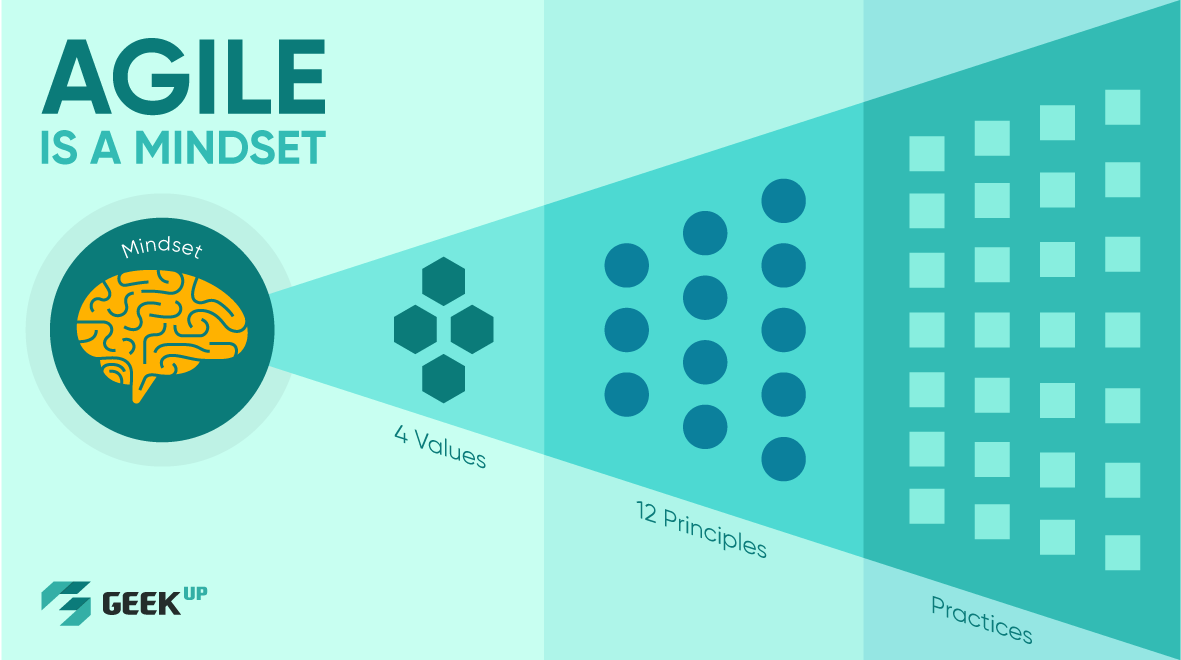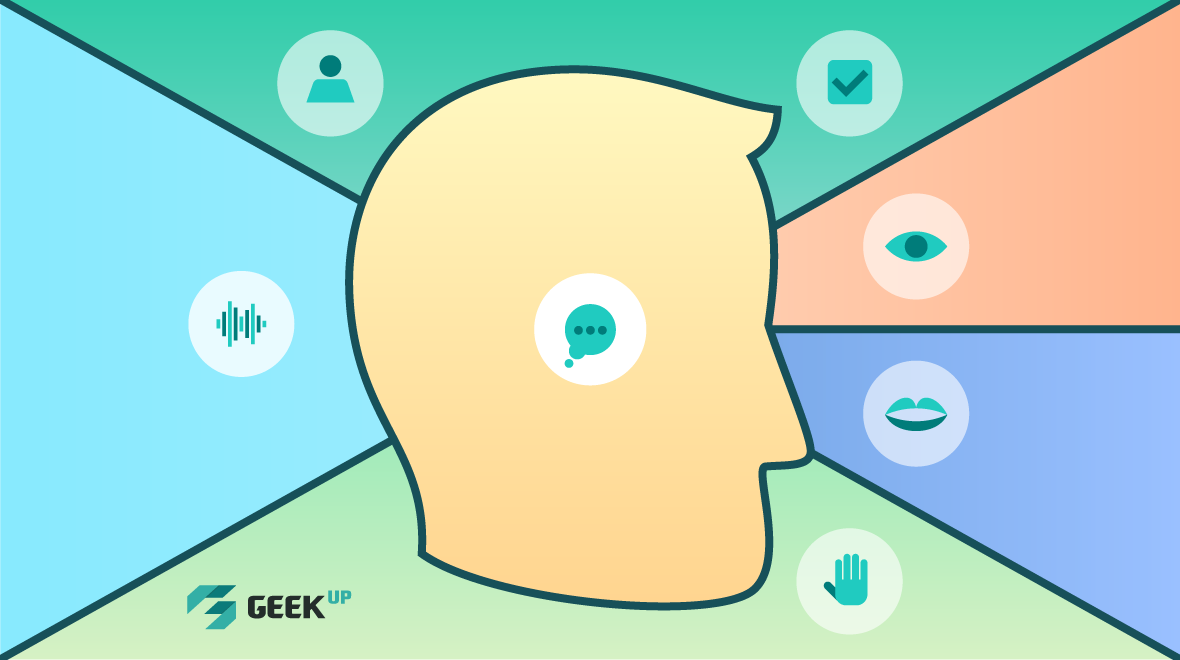5 min read
Agile Mindset - “Golden key” boosts the survivability of digital products

Building digital products go along with many risk factors as well as opportunities and poses great challenges to traditional project management methods. Taking the Waterfall model as the typical lesson of restraints: 66% of the reasons for failed projects are derived from the lack of mutual understanding between the sales teams and the IT team leading to inaccurate product description (Forrester Research), 40% of end users report bugs (Gartner) and 60-80% of projects fail because of the limitation in the process of collecting, analyzing and managing product description (Meta Group).
One of the great risks that lead to the failure of DX projects is falling into "Watermelon project": the data visualization shows the project status is stable and has a chance to complete as the commitment. However, many pop-up problems then affect the final result because stakeholders do not follow the progress, project status as well as the product quality and completion level.
One of the solutions is to “equip” the Product team with an Agile Mindset.
Agile Mindset - What is Agile Mindset?
Agile Mindset leads towards thinking and doing in accordance with Agile, the methodology was born in 2001 with the Agile Manifesto consisting of 4 values and 12 principles that is widespread through practices and workflows helping many organizations improve their performance.
Agile methodology has fundamentally changed software development as well as in many other fields. More and more organizations and Product teams are aware of the importance of this manifesto and then apply Agile principles & values in their daily work. The foundation of the Agile Mindset is based on the four values that this mindset aims at:
⁃ People and interactions are more important than processes, tools
⁃ Products that work well are more important than fulfilling documentation
⁃ Collaboration with customers is more important than contract negotiation
⁃ Coping with the change is more important than sticking to a plan
In general, Agile helps the team focus on "doing right" instead of "who is right", adapting to changes and volatility to deliver products more quickly and on time, as well as encouraging a working style with constant innovation, focusing on bringing value to customers, actively "self-management" as well as promoting cooperation and coordination between other members and customers through daily meetings to collect feedbacks. This is shown in the 12 principles of the Agile Methodology:
⁃ Satisfying customer’s needs is the top priority
⁃ Accepting changes in each phase of the project development
⁃ Creating deliverables first and then polishing products
⁃ Cooperating closely between the product team and sales team
⁃ Creating high-quality products through projects executed by an inspired team
⁃ Practicing face-to-face communication is preferred over other types of interaction
⁃ A working product is the primary measure of progress
⁃ Lining up the sustainable development pace
⁃ Investing sufficient time to deliver high-quality products
⁃ Minimalism is ultimate
⁃ The self-management team is an ideal condition
⁃ Learning from both successes and failures
Practicing Agile Mindset through popular frameworks and processes (Scrum, Kanban,...) supported by Agile project management tools (Jira, Asana,...), the product team can quickly adapt to changes and create more value for customers.
The benefits of the Agile Mindset are not just for product teams
Agile Mindset offers the opportunities to improve productivity and capability for Product teams through specific practices:
Focusing on people, inspiring the sense of working for each individual
⁃ Encouraging initiatives, self-organization, and a high sense of responsibility in the team
⁃ Boosting the bonds between members through direct interaction
⁃ Improving team's capacity by encouraging each member to share experience
⁃ Enhancing ability to solve problems quickly
⁃ Continuously improving and creating more high-quality products through short iterations
⁃ Creating a transparent working environment
⁃ Increasing the ability to coordinate between members and customers
⁃ Driving the process of constant improvement
⁃ Appreciating human resources and customer values
The specific benefits are not only for the Product team, but an Agile Mindset also helps businesses to grow more sustainable when these values are spreaded within the organizations:
⁃ Understanding customers' problems in the context of socio-economics and business goals instead of merely technical aspect
⁃ Maximizing customers’ satisfaction, creating a premise to attract target customers sustainably
⁃ Continuously improving and delivering outcomes, suggesting better ways of working and organizing
⁃ Increasing the quality of the products/services
⁃ Prioritizing resources for critical issues, following the right directions and suitable methodologies
Cooperating with an Agile-mindset partner brings many benefits for businesses doing digital transformation or planning to build strategic digital products, especially those have new breakthrough product ideas but still rarely know how to deploy the product:
⁃ An Agile-mindset product partner will constantly optimize workflow and coordination to speed up the development process, and shorten the time to create deliverables for testing and gathering business feedbacks and insights to quickly improve and create products that fit descriptions and ideas.
⁃ An Agile-mindset product partner will aim to build and upgrade products according to each improvement iteration, regularly discuss with businesses to conduct product testing, and timely make adjustments at the first stage of the development process, helping businesses save resources and track the "maturity" and product quality.
⁃ An Agile-mindset product partner always highly recommends collaboration with customers at all development stages: this eliminates fallible products due to misleading and ambiguous descriptions which come from misunderstanding and no consent when communicating for solutions through intermediate layers. For example, businesses just come up with ideas without a specific picture of the final product; this idea is analyzed by the business development team into product descriptions but does not show all the vital aspects due to a lack of insights, leading to the ambiguity in product development teams hence they delivers the unmet expectation products
⁃ An Agile-mindset product partner follows one of the principles of Agile is "A working software is the primary measure of progress", aims to "work based on value" and eliminates tasks having bad impacts on products or businesses. The team will directly work with the customers to know what requirements are high priorities, what brings more values, and what prefers early release in the development process, helping to optimize the value of the project, thereby increasing customer’s satisfaction.
Challenges when building an Agile mindset for the product development team?
The resources of instruction and tools to practice Agile method are more and more popular and easily accessible, but the biggest challenge in building an Agile Mindset for product teams is the barrier in thinking: most of the members are thinking in traditional way, and passive in allocating tasks, while Agile Mindset requires the proactiveness in self-organizing as well as cross-functional capabilities of all members to interlock leading to complete backlogs. Adapting the new mindset requires more time and efforts of each member.
In addition, how to encourage members to share thoughts and ideas freely in the review and retro meetings is also a challenge for the Agile-mindset teams. This limits the effectiveness of learning and improving in iteration process.
How to practice Agile Thinking effectively?
To build the Agile Mindset sustainably, besides being guided and trained about Agile practices methods, product team members can practice following activities:
⁃ Continuously reviewing Agile values and principles: to apply in daily work
⁃ Regularly clarifying targets, goals, and results: to plan and execute work to achieve those. Clarifying the project's vision will help the team clearly define the roles and tasks that team members can get support for.
⁃ Focusing on understanding and satisfying customers: constantly exploring needs, feedbacks, and ideas from customers to create high-quality products, provide the best solutions, and meet the right requirements.
⁃ Learning to communicate and coordinate with other team members: to show appreciation for other members' supportive activities, as well as recognize their contributions and skills to the success of the project,… to build harmony and a comfy atmosphere. Regularly doing daily meetings, updating work progress, sharing challenges, knowledge, and lessons learned, and jointly solving problems is also a way to connect with other members.
⁃ Transparent information and activities: Frankly sharing responses and issues in daily meetings instead of keeping all important information, data that will help the teams to receive valuable feedbacks and monitor product development and boost the team motivation. In case of unexpected problems, each member is quickly aware and proposes suitable solutions, increasing trust, communication, and discussion. The team will focus on one of Agile's foundational values "Products that work well are the most transparent metric".
⁃ Creating an environment that encourages the initiative of members: GEEK Up applies a flat organization model with self-assignment groups not based on company titles or the hierarchy organization, which promotes the self-organization of each member in arranging work, creating a favorable environment for members to continuously practice and apply Agile mindset more proficiently.
Agile Mindset supports GEEK Up to create products that positively impact business performance
Agile Mindset along with flat organizational model helps GEEK Up to be flexible to meet product requirements, assurance the quality, development progress as well as cost, and effectively coordinate with many business partners to build products that have positive impacts on business performance. Some typical products include:
2 likes
Get latest updates from GEEK Up
Our email packed with digital product insights, trends and case studies.


